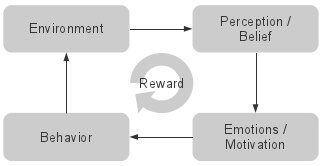- An empathy gap is the when you think you’ll feel a certain way when you’re planning an activity and you feel something completely different when you’re performing the activity
- Example: Making a commitment to go to the gym every day, but then skipping out going because you’re busy or feeling lethargic
- Figuring out how to overcome empathy gaps is an important step in being able to fulfill long-term commitments
Part 1: One of the most insidious barriers to getting things done
- When you feel one emotion you generally can’t conceive of your motivations when feeling a different emotion
- When you plan to do something, you general feel positive emotions. When you act on those plans and encounter obstacles, you feel negative emotions
- These negative emotions can run counter to and override your goals
- This difference between feelings during planning and feelings during execution is the empathy gap
- Examples:
- Trying to rush through a hot shower on a cold morning
- Trying to stick to a diet while surrounded by rich foods
- Talking to someone who consistently makes you angry, and trying to avoid an argument
- Trying to wake up quickly when tired
- The common thread with all of these scenarios is that your values outside of the situation are different from your values inside the situation
- We think our values are much more immutable than they actually are
Part 2: Research and Experiments
- Not only does judgement change, but people can’t predict that their judgement will change
- Examples:
- Sexual arousal: people drastically underestimated their willingness to forego safe sex precautions when they were aroused
- Physical pain: people drastically underestimated the effect that physical pain would have upon their cognitive skills, both before and after pain was applied
- Bullying: people underestimated the effect that being ostracized had on them, both before and after the ostracism
- People have a hard time understanding how people in other emotional states feel, even when those other people are past or future versions of themselves
- People imagine that other people need less motivation than they actually do
Part 3: Why Empathy Gaps Make Sense
- Empathy gaps are to be expected given the following model of the emotional system:

- Emotions depend on environment, perception, and behavior
- If the environment changes, then our perceptions change, which then changes our emotions and motivation
Part 4: Overcoming Empathy Gaps
- Awareness
- Expect empathy gaps
- Try to imagine how you’ll feel when you’re in the environment in which you’re taking the action and plan accordingly
- Experience
- If you’ve ever overcome an empathy gap before (even if it was in a different context), try to replicate the effect
- Learn from others
- Change your environment
- Can you change your environment so that the environment in which you’re doing things is more like the environment in which you’re planning?
- Change your beliefs
- Awareness affects you through perceptions, which are filtered by beliefs
- Can you change your beliefs so that environmental stimuli have a different effect?
Examples of Empathy Gaps
- Teenagers and pregnancy
- Power corrupting
- Empathy gaps can be used to one’s advantage
- It can be easier to plan going to the gym, and then doing exercise once you’re there than it is to plan to exercise
- Avoiding unhealthy foods is a lot easier if you add to the empathy gap by putting the food farther away
- Living in a totalitarian regime
- Most people don’t think that they’d go along with the actions of a totalitarian regime, yet most do
- Aging
- People can’t appreciate the motivations and lives of people significantly older than themselves
Hard Projects Will Be Harder Than You Expect: How To Prepare
- Intellectual antcipation of difficulty does not prepare you for the emotional motivation to stop that you’ll feel when you encounter obstacles
- Hot-cold empathy gap → Hard to anticipate how you’ll react in the heat of the moment ahead of time
- Empathy gaps require willpower to overcome, and the best strategy is to minimize the number of empathy gaps so that you can apply maximum willpower to each one
A Model That Explains Why Your Enthusiasm When Planning Disappears When Doing
- Emotions react to what you perceive in the moment → when moment changes, motivation changes
- When you’re planning, you’re thinking more about the end product than the steps required to get there
- Strategies to deal with empathy gaps:
- Know about the effect
- Observe and learn from empathy gaps in others
- Build on experience
- Change your environment
- Change your beliefs
